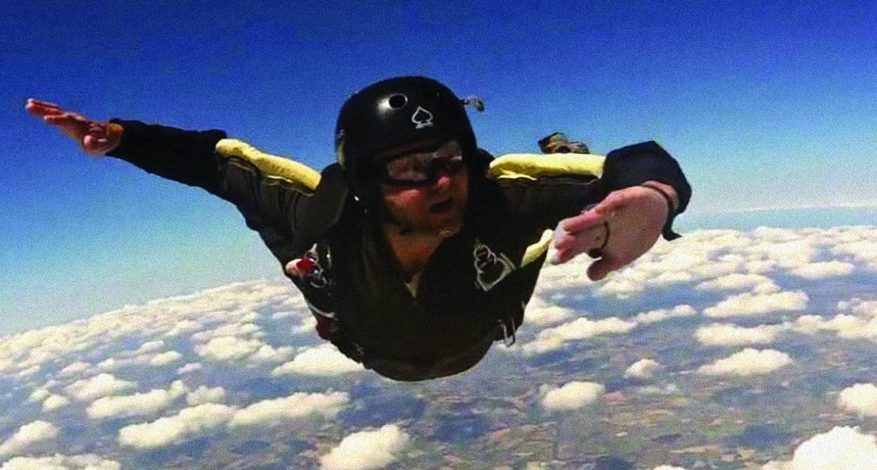Skydiving for MND
An interview with Simon Holland, Yello Studio, about his skydive to fundraise for the MND Association.
Questions by Scarlett Parr-Reid, Editor
Why did you choose to fundraise by doing a skydive, and not another activity?
“Back in 2004, travelling with my now wife, we decided to do a skydive, which was great. 14 years later, a good friend had his 40th birthday and wanted to do a skydive, so I did another one. After a chat, we de-cided to jump solo. I completed a level 1 course and decided to do this for charity. Originally, we wanted to do a wing-walk, however we decided that jumping out of a plane was pretty crazy anyway. And we raised £1200! I then carried on with the course and I am a qualified skydiver.”
What are the most important aspects of treatment for someone living with MND, in your opinion?
“Everyone is different and everyone requires different treatments. From our experience, acupuncture and massages were good for my mother, which helped her muscles. Drugs which alleviate pain and muscle aches do also help. I was interested to know that acupuncture helped. Whether it took her mind off things, or physically helped, I’m not sure.”
Where do you see MND research going in the future, especially as we are increasingly aware of its multifactorial na-ture?
“It’s all about collaborating in the research community, which is key to facilitating growth in research. We can’t take our foot off the gas with funding. It’s all about sharing the knowledge. The ‘Ice Bucket Chal-lenge’ was a great awareness tool to raise a lot of cash.”
What makes care truly holistic, in your eyes?
“That’s an interesting question, and I haven’t really thought about that properly before. I’d say, joined-up thinking services: care services and hospices. Everyone needs to be on the same page, which we found they were. Massive support from association visitors and health professionals make things a lot easier for those living with MND, their family and friends.”
Is there enough support for families?
“Yes. The association visitor for the Exeter and East Devon Branch, Cynthia Hopkins, was amazing, and without her it would have been a very different experience. A negative in our experience was within the NHS hospital, where I don’t think the nurses fully understood the disease and couldn’t fully understand what we were going through. Society, in general, doesn’t always understand and so it was quite frustrat-ing when the nurse treated my mother in a way that wasn’t right for her.”
If you could say one thing to someone out there living with MND right now, what would you say?
“That’s a really tricky question. Again, everyone is different and, to be very honest, I wouldn’t know what to say. If, in the future, I could bring myself to speak to someone, I would say to take things one step at a time, day by day. There are different levels of the disease, and this can be slowed down by drugs, but just don’t live too far in the future. There can be laughter, tears, stress. We had many laughs; it’s not com-pletely hopeless and you can have great support from (associations such as) the MND Association.”
What do you believe is the best way to raise awareness for, and galvanise public action around, MND?
“It’s interesting as at the time, for me, many were ignorant of the disease. They didn’t understand it, or have any knowledge about the symptoms. It’s important to educate people. For example, social media is very powerful, like with the ‘Ice Bucket Challenge’. It gave people an idea of what MND and ALS are. Use of mass media, i.e. when a celebrity promotes the disease, the public will listen more, social media is something to keep pushing.”
As a supporter of the MND Association charity, what do you think we could improve upon in order to give the best support and services to those who need them?
“It’s not so much an improvement, but from our experience the Association Visitor, Cynthia Hopkins, who I mentioned before, was our saviour. At the time, she had a lot of people to visit, and we wouldn’t want visitors to spread themselves too thin. So, all I can say is to try and recruit more Association Volun-teers, as I know it can be very stressful for them to experience. Putting themselves in front of all of these families must be tough.”
How do you prefer to hear updates about what we are doing as an association, be it fundraising, research, raising awareness or engaging with the public?
“I run a business, which is a branding website. If people are genuinely interested in receiving information on events, then texts are good to reach them directly. Email promotions around research are also benefi-cial, however these are more appropriate for those already interested in it. I’m all for low cost marketing, so that money can be directed to where it is needed. For example, blog posts and websites, which I myself am helping to develop for your branch.”
Is there anything you would like us to add to the newsletter?
“We are a private family and if support groups were offered, we didn’t really choose to go for them. I think it’s important to have assurance of the support you can expect – something that gives clear advice and information straight away. The MND Association website is all there, but sometimes it’s quite daunting.”

